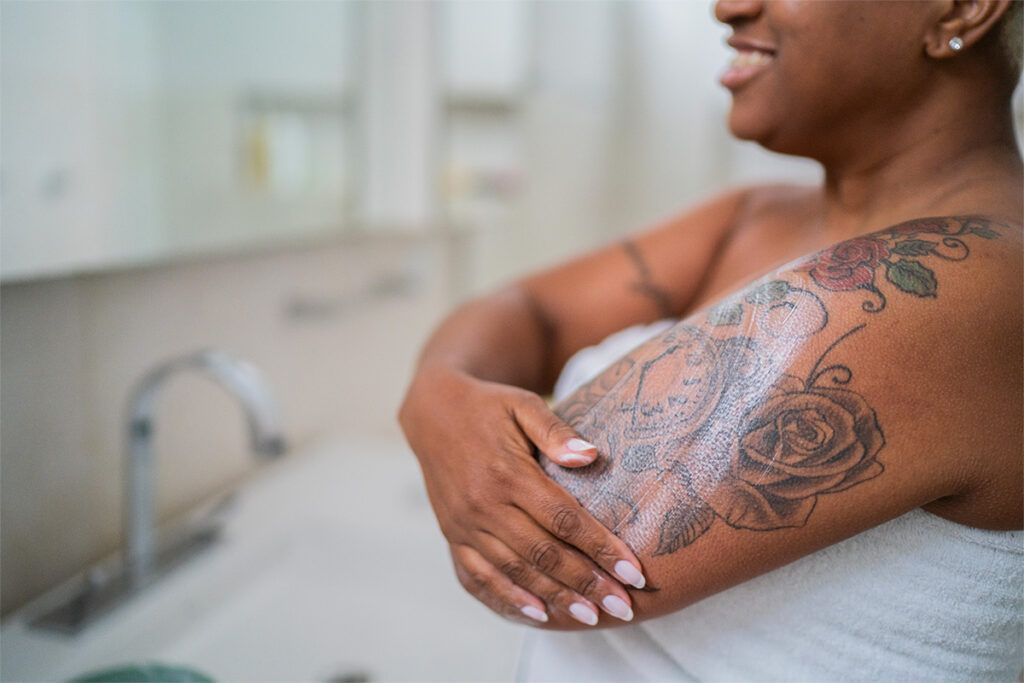While several types of eczema exist, atopic dermatitis is the most common.
Eczema can affect anyone, but it is more likely to develop in Black children. According to the National Eczema Association, Black children in the United States are about 20% more likely to develop eczema during their youth than white children.
Despite this, research shows that the overwhelming majority — over 90% — of skin condition pictures that appear in Internet searches are of light skin. Representation of eczema on skin of color is lacking.
Because of this, when you think of eczema, you probably think of red, dry, and sore patches on the skin, which is not how it appears for everyone. Eczema flare-ups on darker skin can look darker brown, purple, or ashy gray in color.
Symptoms on darker skin

Knowing how to identify eczema on darker skin will help you get the treatment you need faster.
Some signs of eczema to look for are:
- dark brown or purple patches, known as hyperpigmentation
- swelling
- dryness and scaling
- itching
- thickening of the skin (lichenification)
Eczema can appear in different places on the body depending on your skin tone. In people with light skin, eczema most often appears in the creases of the knees and elbows.
If you have a darker skin tone, you are more likely to develop:
- small bumps, or papular eczema, on your torso, arms, and legs
- small bumps around your hair follicles
- dryness and dark circles under your eyes
- lighter or darker patches on your skin where flare-ups start to heal
- prurigo nodularis, which is where scratching causes the skin to firm up and thicken
Causes of eczema
Eczema can develop because of both genetic and environmental reasons. A family history of eczema or allergies such as hay fever can mean you have a higher chance of developing eczema.
Despite eczema being more common in Black people, researchers still do not fully understand the genetic links to eczema in these populations.
Mutations in the filaggrin gene, which have a strong link to eczema in white populations, do not appear to have the same influence in Black people.
Researchers think that there are different genes responsible for the immune response that causes eczema in Black people. For example, genetic mutations responsible for changes to your skin barrier and skin immune cells can be more common in certain racial groups.
Treatments
Treatments for eczema flare-ups are typically the same regardless of your skin tone or ethnicity.
The most important thing to remember is to keep your skin moisturized. Dry skin is more likely to cause an eczema flare-up and can make an existing flare-up itchier. The more you itch, the worse the flare-ups can get.
Steer clear from any products with “exfoliating” on the label, like facial scrubs. Stick to a moisturizer that is fragrance-free but very moisturizing.
There are medications you can try that work to stop the inflammation that causes eczema. It is typically a trial-and-error process when it comes to finding the eczema treatment that works best for you.
Some common medications include:
Topical medications
There are various types of topical creams and ointments available you can try. Some are available over the counter (OTC), and some are prescription only. If OTC creams do not work, your doctor may recommend one of the higher-strength prescription options.
Some of these include:
- Topical corticosteroids: These include triamcinolone (Kenalog) and amcinonide (Cyclocort).
- Topical calcineurin inhibitors: These medications, like tacrolimus (Protopic), help stop the immune process that causes eczema.
- Topical PDE4 inhibitors: These are available as ointments, like crisaborole (Eucrisa). You may notice a slight stinging sensation after use.
Oral medications
Oral OTC medications, like antihistamines, can relieve itching by blocking your immune system from reacting to histamine.
Examples of oral antihistamines include:
- fexofenadine (Allegra)
- loratadine (Claritin)
- cetirizine (Zyrtec)
Another treatment is oral steroids. These are prescription-only drugs for treating severe eczema flare-ups. Doctors typically will not recommend them for use over long periods and normally reserve their use for extreme cases.
The Skin of Color Society suggests the following natural ways to help manage eczema flare-ups:
- avoid hot showers and baths
- avoid tight-fitting clothing
- choose fragrance-free soaps
- bathe or shower only once per day, then pat your skin dry and moisturize straight away
Many people find that certain things trigger eczema flare-ups. Being able to identify your personal triggers can help prevent an eczema flare, so you can better manage your symptoms.
Common triggers can include:
If you need help covering the cost of medications, the free Optum Perks Discount Card could help you save up to 80% on prescription drugs. Follow the links on drug names for savings on that medication, or search for a specific drug here.
